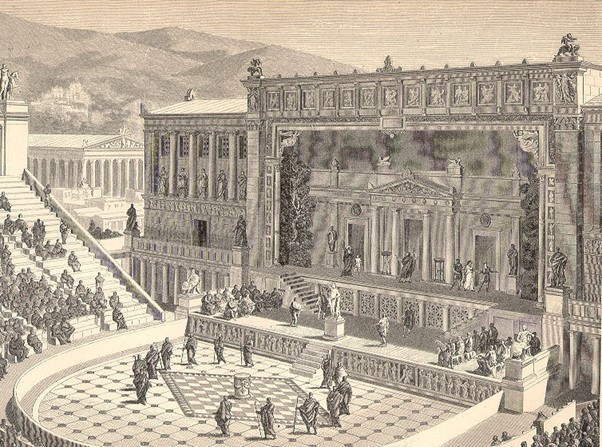With the rise of stage and movie musicals like “Hamilton”, “The Greatest Showman”, and the many Disney animated hits in the last decade or so, it’s hard to ignore the influence that Musical Theatre has on contemporary culture, whether it be in films, music, and other media that we consume these days. In this blog article, we trace back the lineage of musical theatre as we know it today.

Deepest Roots from the Ancient World to Medieval Europe
Musical theater in Europe dates back particularly in the 5th Century B.C.E. to the theater of the ancient Greeks, who included music and dance in their stage comedies and tragedies as early as the fifth century B.C.E. Aeschylus and Sophocles even composed their own music to accompany their plays.
With the expansion of the Roman Empire, theatrical traditions continued to evolve. Romans adapted and expanded upon Greek theatrical forms, incorporating music and spectacle (sets, backdrops, practical effects, stage machinery, sound effects, and more elaborate costumes) into their productions.
During the medieval and Renaissance periods, religious dramas, morality plays, and courtly entertainments in Europe often included elements of music and dance. Commedia dell’arte in Italy and masques in England also featured musical components in their performances.
Europe: The Birth of Operettas and West End Splendor
Although music has been a part of dramatic presentations since ancient times, modern Western musical theatre evolved during the 19th century, with the emergence of operettas. Composers like Jacques Offenbach in France and Gilbert and Sullivan in England crafted light-hearted, comedic works that combined spoken dialogue with musical interludes. The genre gained popularity across the continent, offering a delightful escape into whimsical tales and catchy melodies.
In the early 20th century, London’s West End became a vibrant hub for musical theatre. Pioneering productions like “Show Boat” (1927) and “Oklahoma!” (1947) introduced a more integrated form of musical storytelling, influencing the evolution of the genre.
USA: Broadway’s Rise to Theatrical Dominance

Across the pond, musical theatre in the United States found its voice on Broadway, where it flourished in the early 20th century. The groundbreaking “Show Boat” marked a turning point in 1927, integrating music, dance, and narrative in a way that would define American musicals. The Golden Age of Broadway, from the 1940s to the 1960s, witnessed the creation of iconic shows such as “West Side Story,” “My Fair Lady,” and “The Sound of Music,” showcasing the talents of composers like Leonard Bernstein and Richard Rodgers.
The late 20th century brought innovation with concept musicals like “Company” (1970) and “Cats” (1981), as well as the rise of mega-musicals such as “Les Misérables” (1985) and “The Phantom of the Opera” (1986). These productions achieved global acclaim, solidifying Broadway’s reputation as a cultural powerhouse.
Contemporary Trends: Diverse Narratives and Global Impact

In recent decades, musical theatre has evolved to embrace a broader spectrum of stories and styles. Contemporary productions like “Hamilton” (2015) and “Dear Evan Hansen” (2016) have pushed boundaries, exploring diverse themes and musical genres.
The influence of both European and American traditions has transcended borders, with global audiences enjoying the magic of musical theatre. Today, the genre continues to reinvent itself, marrying tradition with innovation, captivating audiences on both sides of the Atlantic and beyond.
Impact on Education and Learner Development

RSL Performance Arts Awards (PAA) understands that musical theatre can have a profound and positive impact on education by fostering creativity, teamwork, communication skills, and personal development. It provides students with a unique and enriching experience that goes beyond traditional classroom learning.
RSL’s PAA takes the magic of musical theatre, and structures it into a robust and contemporary framework for assessing and developing the skills of aspiring musical theatre performers in the PAA Musical Theatre Exams! From comprehensive assessments to real-world performance simulations, these exams provide a pathway for students to pursue their passion and embark on successful careers in the dynamic world of musical theatre.
To find out more about the RSL Performance Arts Awards (PAA) Exams in Singapore, contact RS Event Center at (+65) 60169395, or WhatsApp us at (+65) 98308519, or send us an email at exam@rs-event.sg and get started on your PAA Journey!

